Jewish Wedding Ceremony Guide


Jewish wedding ceremonies are full of traditions and are wonderful celebrations of love and commitment. For centuries they’ve followed a similar structure and are steeped in spiritual meaning and symbolic rituals.
If you’re Jewish and about to start your wedding-planning journey, you no doubt have a lot of questions about your upcoming wedding ceremony. It’s only natural. But, while there are plenty of traditions at a Jewish ceremony, they’re also exciting and fun, and full of celebrations.
You may wonder how long a Jewish wedding ceremony lasts, the best date to have a Jewish wedding or how much they cost. When you have all the answers, you’ll be in the best possible position to start planning your own wedding.
That’s why, in this post, we’re going to answer the most common questions about Jewish wedding ceremonies. We’ll cover the costs, the traditions and what happens in what order, so you have all the information you need before planning your big day.
For more information about different wedding ceremonies, read our ultimate wedding ceremony guide, which answers even more questions.
What is a Jewish wedding ceremony?
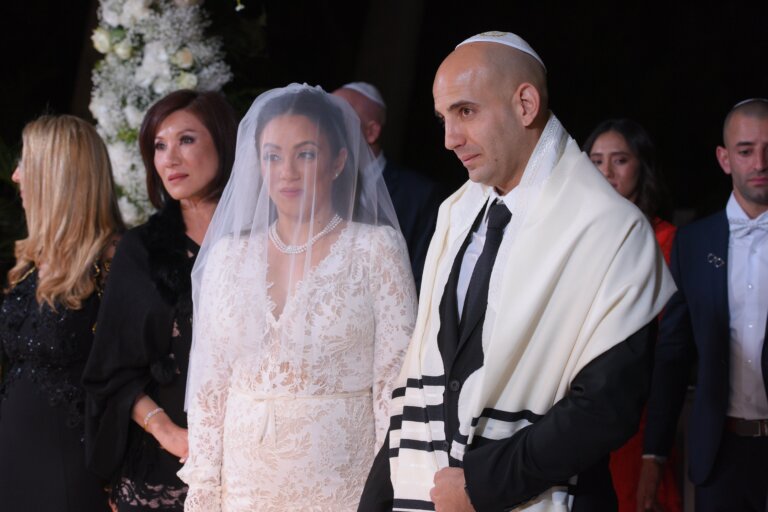
A Jewish wedding ceremony is the coming together of a couple to get married while following the traditions established by their Jewish faith. It’s a time for joy and celebration as a couple promise to love and cherish each other for the rest of their lives. It combines biblical, legal, cultural and historical threads as a promise to your new spouse in front of God.
It’s taught that marriage is linked to the marriage between the Jewish people of Israel and God which happened at Mount Sinai, and is featured in the Book of Exodus.
Jewish ceremonies are absolutely steeped in rituals that have been in place for hundreds, if not thousands of years. However, there’s still a fair amount of personalisation allowed, which means you can make your wedding ceremony your own. That being said, you’re still likely to stick to many of the rituals and traditions that are expected at a Jewish ceremony.
If you’ve never been to a Jewish wedding ceremony before, you may be surprised by the new and wonderful traditions you’ll see, which are very different from traditional or other types of religious ceremonies.
What date should you have a Jewish wedding ceremony?
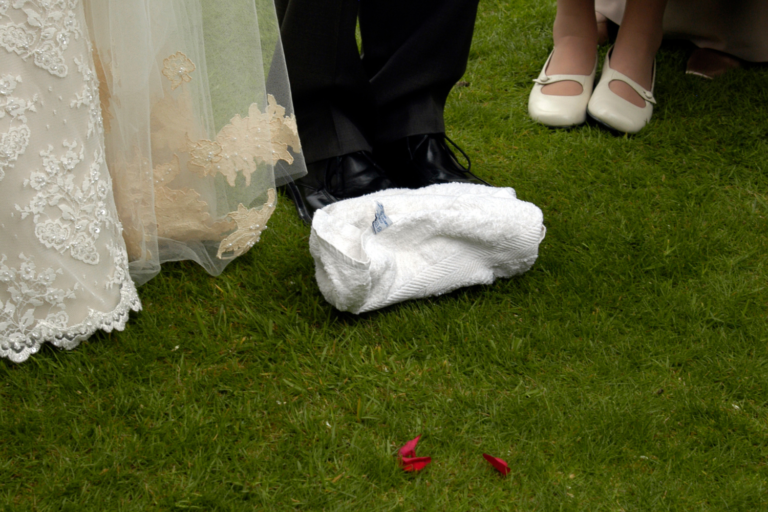
It’s important to pay close attention to the date you choose for your wedding, because it can have huge symbolic (and administrative) importance.
The Jewish calendar has days of joy as well as days of mourning. It’s recommended that you avoid days of mourning as it wouldn’t be appropriate to host a celebration on a date intended for reflection or rest. This means a Jewish wedding will never take place on a Saturday. The most popular day of the week for a Jewish wedding is a Sunday.
You’ll also want to avoid booking a wedding on a date that coincides with another celebration or holiday. For example, make sure you don’t book your wedding to take place at Passover, Yom Kippur, Rosh or Hashanah. Not only will many of your guests be unavailable on these dates, but you’ll also struggle to find a rabbi who’ll be available to officiate your wedding, as many will undoubtedly be busy.
What time does a Jewish wedding ceremony take place?
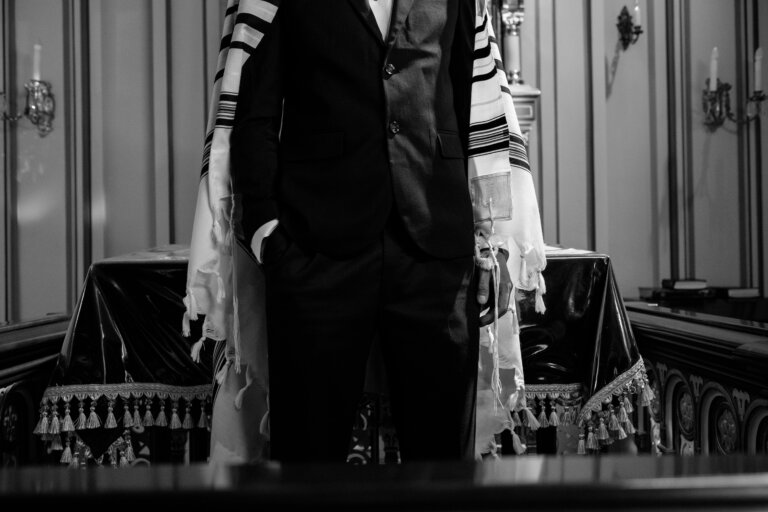
A Jewish wedding ceremony can take place at any time of the day, but will more frequently take place in the afternoon or early evening. While traditional weddings will often last all day, Jewish weddings are usually around seven hours or so long, which is why they tend to start a little later.
Is it common for Jewish weddings to include a religious service?
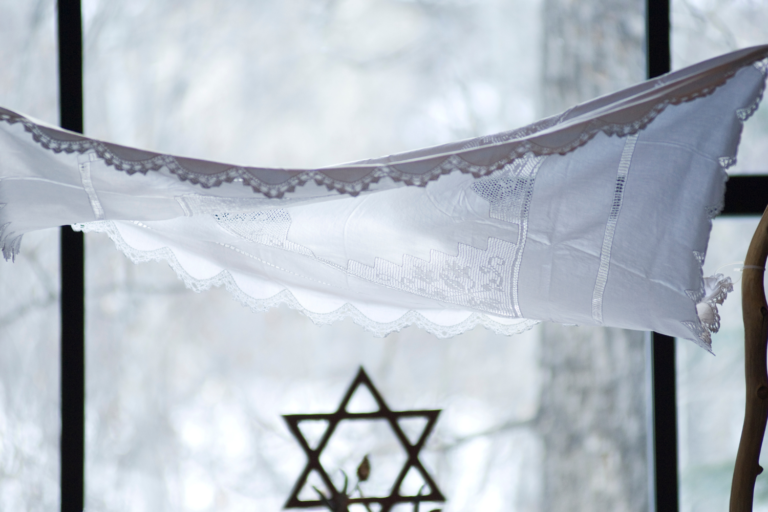
Yes, there will be a religious ceremony at the same time as a Jewish wedding ceremony. A wedding is a hugely important and sacred event that will always include many traditions and rituals, such as readings, prayers and blessings.
How popular are Jewish wedding ceremonies?
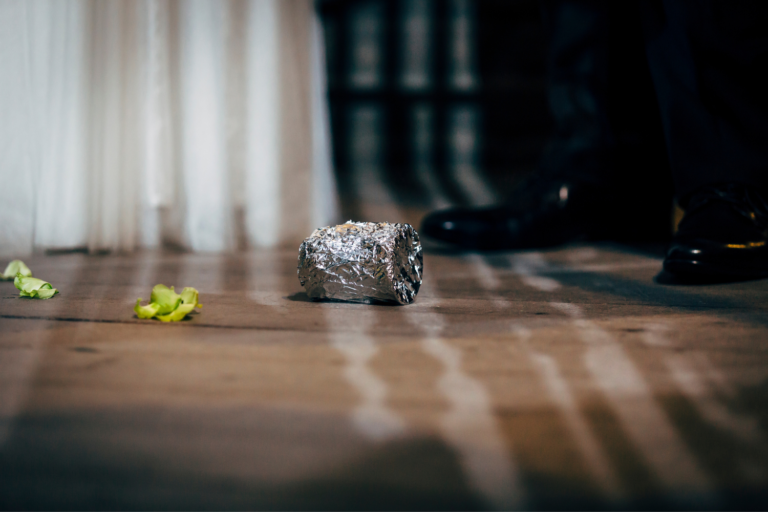
As you might expect, Jewish wedding ceremonies are popular only among Jewish communities. If you’re not Jewish, you’re not able to get married in a Jewish ceremony.
What type of couples usually choose a Jewish wedding ceremony?
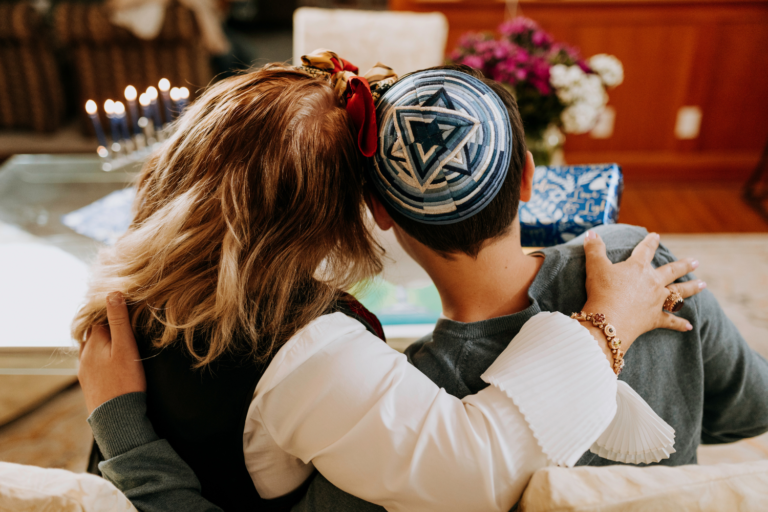
Only couples where both the bride and groom are Jewish can get married in a Jewish ceremony. Mixed-faith marriages, or intermarriages, are common among Jewish people, but it can be difficult to find a rabbi who will perform a wedding ceremony unless they practice Reform Judaism.
A rabbi who’s an Orthodox Jew will be highly unlikely to agree to officiate a mixed-faith ceremony. In this case, if you’re set on a Jewish ceremony, the non-Jewish half of the couple would need to convert to Judaism.
Are Jewish weddings expensive?
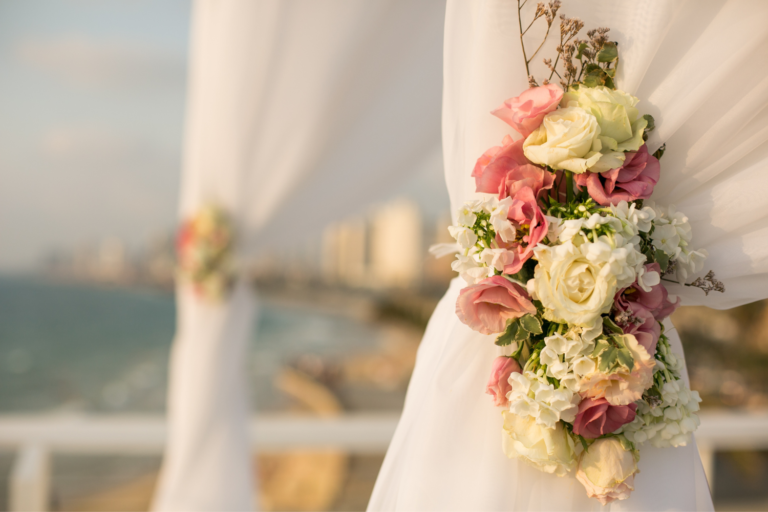
According to Bridebook’s 2023 Wedding Report, the average cost of a wedding in the UK is £19,184. This may already sound like an eye-watering amount, however, it actually may be reasonable when compared to many Jewish weddings.
According to data from The Jewish Chronicle, Jewish wedding celebrations can cost as much much as £55,000. It’s thought that many couples feel pressured to keep up with others who throw lavish and expensive weddings, which is causing many to spend more and more.
However, spending so much on your wedding doesn’t need to be the case. Creating a budget and sticking to it is vital if you want to avoid costs spiraling.
Thankfully, you can throw a beautiful Jewish wedding and not spend anything close to £55,000. It all depends on your preferences, tastes, style and – mainly – budget.
For plenty of tips and information for keeping costs down, read our guide on how to save money on your wedding.
What is the breaking the glass tradition at a Jewish wedding?
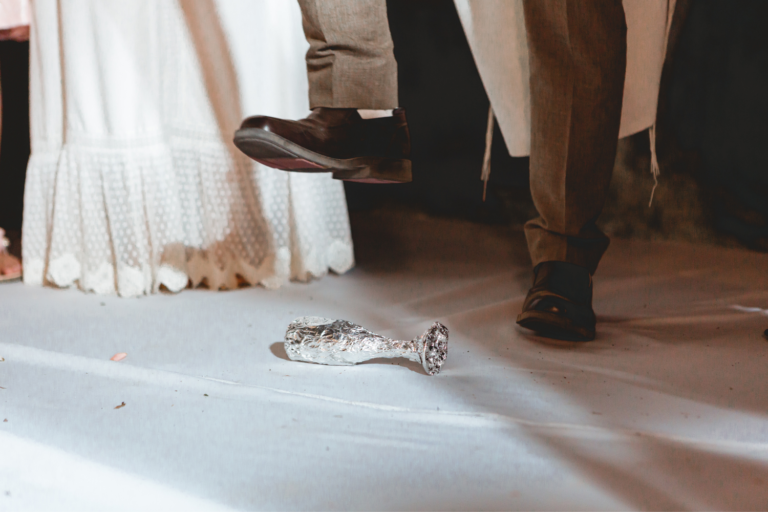
The tradition of breaking a glass at a Jewish wedding ceremony is possibly one of the most widely known, even for those who aren’t Jewish themselves.
The glass that’s broken is often a wine glass, but some choose to break a light bulb as the glass is thin and easily broken. Traditionally, the groom is the one who’ll stand on the glass which is placed under a towel or cloth for safety. But, many modern Jewish couples like to break the glass together, or may even choose to break a glass each.
What the tradition actually stands for is down to individual beliefs and interpretations. Many see the glass as a representation of love and marriage, and how breaking the glass symbolises just how fragile marriage can be. Others claim it might represent the First Temple of Jerusalem, which was destroyed by Nebuchadnezzar, the king of Babylon, in 586 BC.
After the glass is broken, the guests will all cheer by shouting Mazel tov, which is the Yiddish word for good fortune or congratulations.
Who officiates a Jewish wedding ceremony?
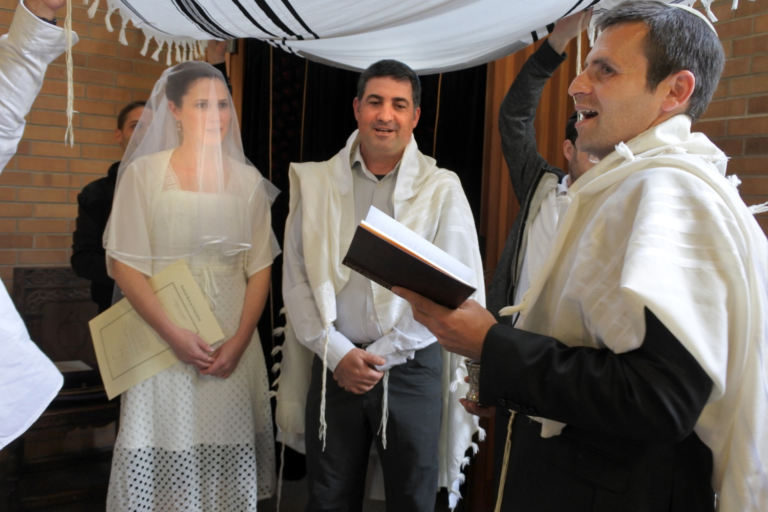
A Jewish wedding ceremony is officiated by a rabbi, who is a Jewish spiritual leader. The rabbi makes sure that the correct rituals are upheld at the ceremony. There also needs to be a registrar to ensure the marriage is legal, which may be the rabbi, or more likely another member of the synagogue.
Is a Jewish wedding legally binding?
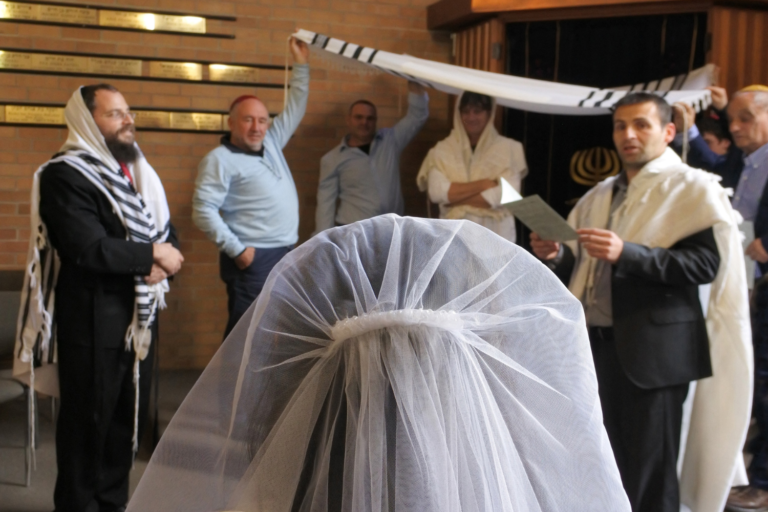
Yes, a Jewish wedding is legally binding in the UK so long as the synagogue’s registrar and two witnesses are present at the ceremony.
Where are Jewish wedding ceremonies held?
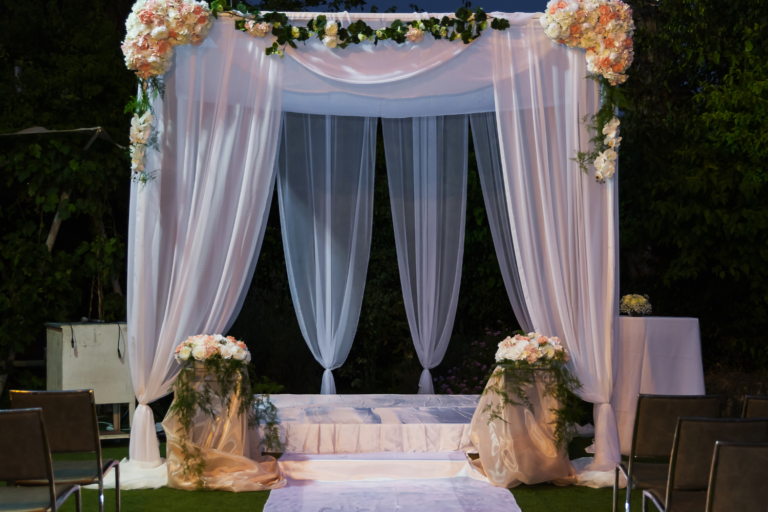
There’s a lot of flexibility when it comes to where a Jewish wedding ceremony can take place. This may be in a synagogue, a Jewish place of worship, or it could be another appropriate venue. It could also take place outside, which is fairly common with Jewish ceremonies – but mainly in warmer and more reliable climates than that experienced here in the UK.
The main consideration for a ceremony venue is that a chuppah can be set up. A chuppah is a cloth canopy that’s held up by four supporting posts and represents the Jewish home. This is often why Jewish ceremonies take place in large or open spaces, so they can accommodate the chuppah. Today, modern Jewish couples may opt to have the ceremony at a venue such as a hotel, which can also host the post-wedding celebrations.
How long are Jewish wedding ceremonies?
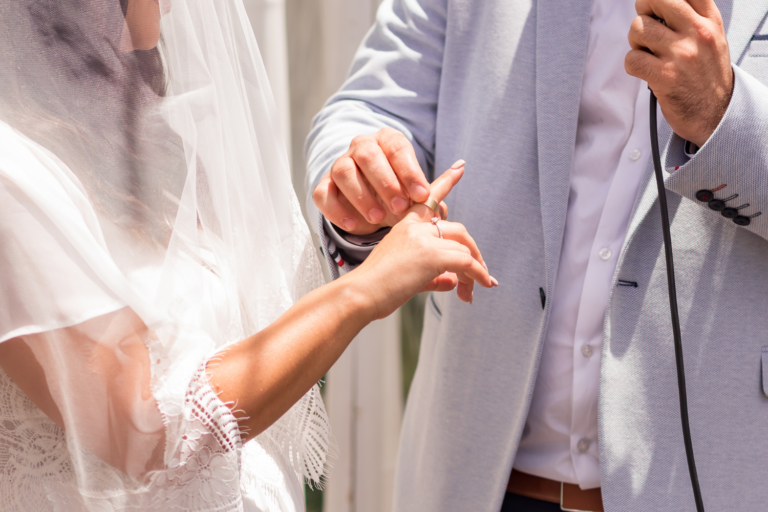
Jewish wedding ceremonies are usually between 30 and 45 minutes. This is because there’s usually a set structure that includes a lot of religious rituals and traditions.
For information on the length of different wedding ceremonies, read our guide to how long wedding ceremonies take.
What words are exchanged at a Jewish wedding ceremony?
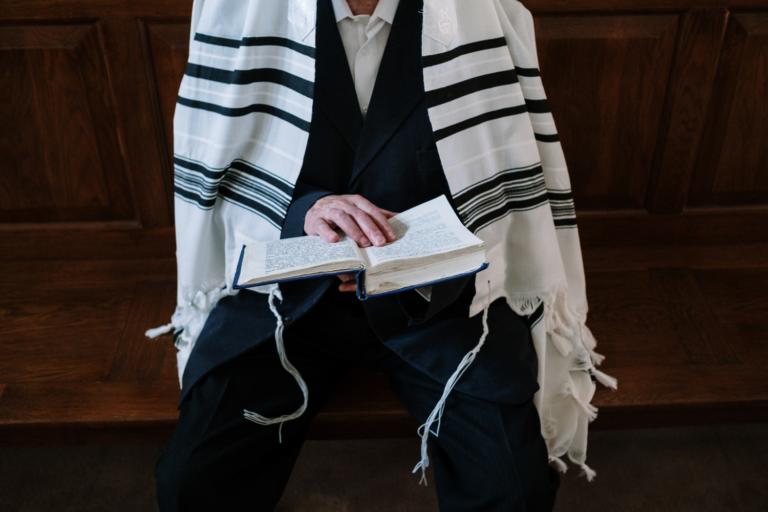
During a Jewish wedding ceremony, the vows are exchanged at the same time the rings are exchanged. The words they exchange are:
Harey at mekuddeshet li B’taba’at zo k’dat Moshe V’israel.
In English, this means:Behold, thou are consecrated unto me with this ring according to the law of Moses and Israel.
The couple will often recite words from the Song of Solomon, which are, Ani L’dodi V’dodi Li. This means, I am my beloved’s and my beloved is mine.
Do Jewish couples fast before the wedding ceremony?
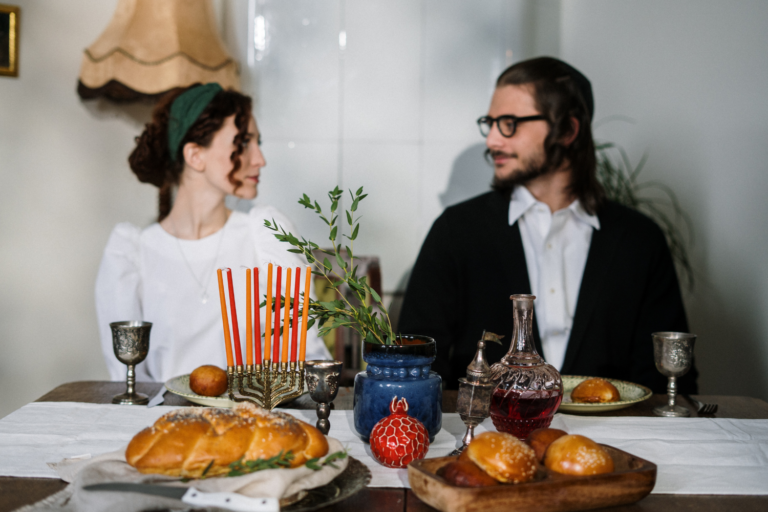
Because a wedding day is considered a day of forgiveness, many couples choose to honour this by fasting. The fast will continue until after the ceremony when they can share their first meal together.
What traditions are there at a Jewish wedding ceremony?
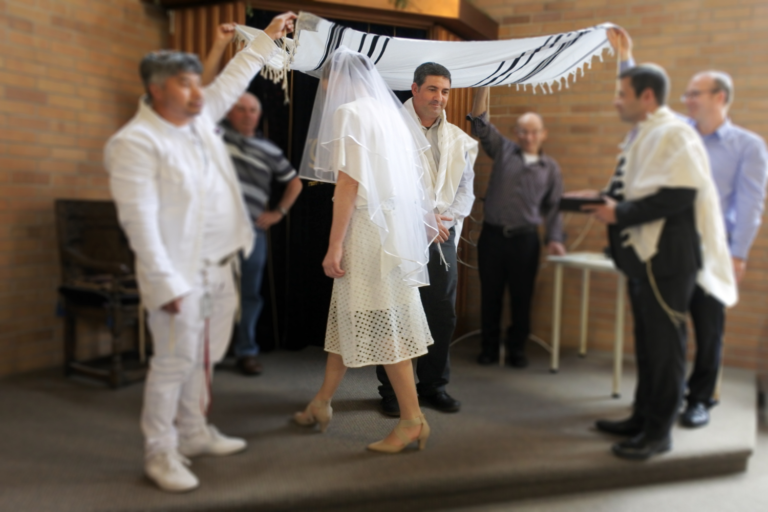
Jewish wedding ceremonies are known for being packed with fabulous traditions and rituals that have a huge amount of meaning. Just some of the most widely known Jewish wedding ceremony traditions include:
- Aufruf, which means to call up in Yiddish. It’s when the rabbi invites the couple for blessings, known as aliyah and misheberach. Guests can throw soft sweets at the couple as a way to wish them a sweet life.
- Ketubah, which is the signing of the marriage contract.
- Bedeken, when the groom puts the veil over the bride’s face to symbolise that he loves her inner beauty.
- Circling, which is when the bride and groom walk around each other to ward off evil spirits and temptation.
- The exchanging of the rings, which is also traditional at many other wedding ceremonies.
- The seven blessings, known as Sheva B’rachot, which are readings performed by family members.
- Breaking the glass, which is possibly one of the most famous Jewish wedding ceremony traditions, where traditionally the groom smashes a glass to symbolise the fragility of marriage.
- Cheering Mazel tov, which means good fortune or congratulations.
What do you wear at a Jewish wedding?
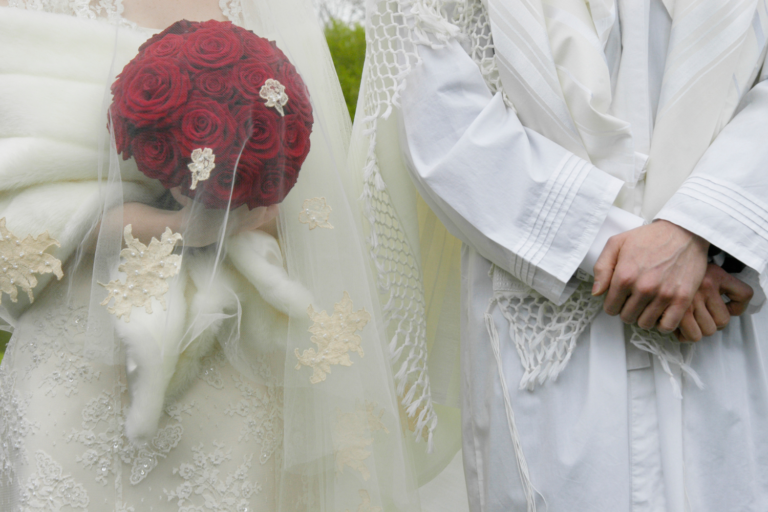
Reform Judaism doesn’t have any requirements or restrictions on what couples should wear to their wedding. However, Orthodox Judaism asks for brides to wear a white dress that covers their shoulders, back and nothing with a plunging neckline. Traditionally, the bride will also wear a veil, especially if the couple wants to honour bedeken.
The groom will traditionally wear a kitel, which is a white linen robe. However, many grooms at modern Jewish weddings prefer to wear a suit.
Guests to a Jewish wedding will usually wear a suit and tie or long evening dress.
What is the order at a Jewish wedding ceremony?
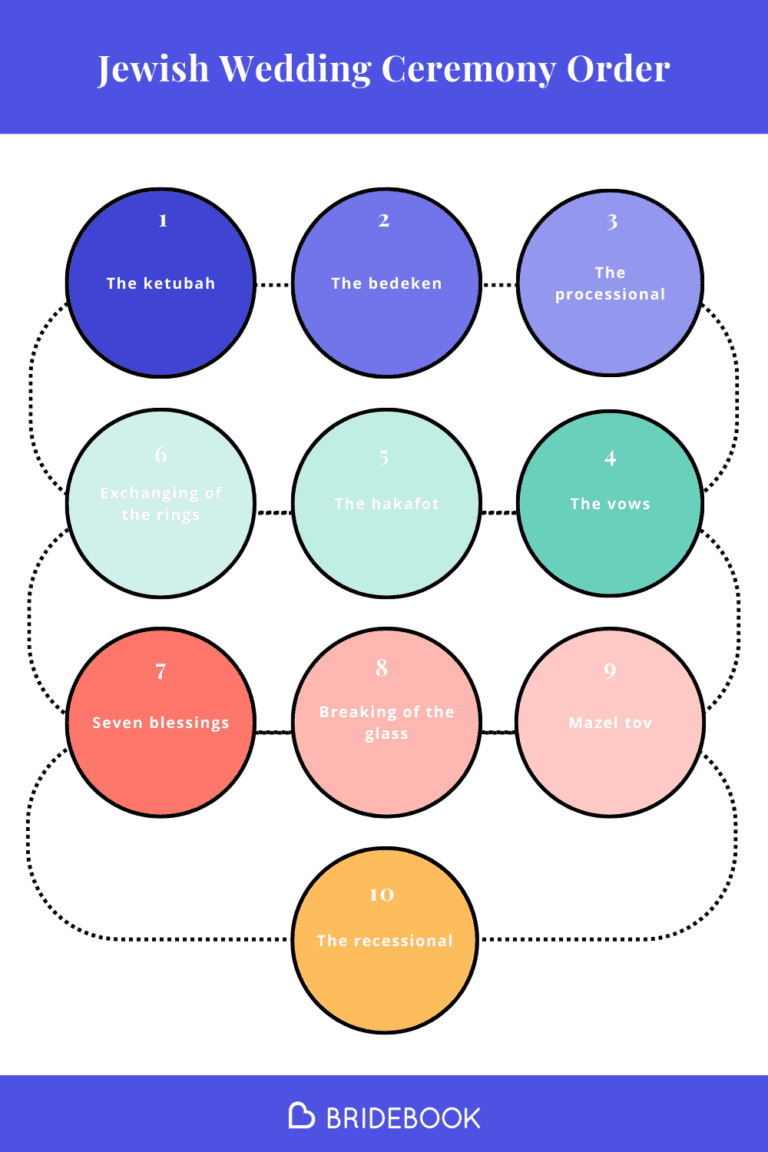
We’ve already mentioned that Jewish wedding ceremonies are filled with many wonderful traditions. As part of this, they tend to follow a set structure to ensure these traditions and rituals are upheld. Below is an example of the order of a Jewish wedding ceremony:
1. The ketubah
Unlike other types of wedding ceremony, the marriage contract, called the ketubah, is signed before the ceremony begins. Two witnesses must also sign the contract, along with a registrar, who may or may not be the rabbi.
2. The bedeken
Next, the groom will veil the bride to symbolise that he loves her for her inner beauty. It also allows him to see her face beforehand so he knows who he’s marrying.
3. The processional
The ceremony commences with the rabbi walking down the aisle first. The wedding party then follows in this order:
- Bride’s grandparents
- Groom’s grandparents
- Groomsmen
- Best man
- The groom and both parents
- Bridesmaids
- Maid of honour
- Ring bearer
- Flower girl
- The bride and both parents
4. The vows
The couple stands together beneath the chuppah, a canopy supported by four tall supports, which symbolises the new home. Guided by the rabbi, the couple recites their vows.
5. The hakafot
The hakafot, also known as the circling, is a lovely ritual that traditionally involves the bride walking around the groom seven times. However, many modern couples like to take turns circling each other to demonstrate how they’ll both protect each other.
6. The exchanging of the rings
The ketubah, which the couple signed before the ceremony, is read aloud. As this happens, the couple exchange rings and a Hebrew prayer is recited. In modern weddings, it may be more common for the prayer to be recited in English.
7. The seven blessings
The guests of your choosing are invited to give blessings, which may be in Hebrew or English. Alternatively, you may ask the rabbi to give the blessings.
8. The breaking of the glass
One of the highlights of the ceremony and a hugely popular tradition. A glass is placed beneath a cloth or napkin, which the groom then stamps on to break it. Modern couples may wish to break the glass together, or break a glass each. Following this, the rabbi usually reads from Psalms.
9. Mazel tov
Guests will excitedly shout mazel tov, which means good fortune or congratulations.
10. The recessional
The ceremony has concluded and the wedding party leaves as the guests celebrate and cheer. The recessional is in the following order:
- The couple
- Bride’s parents
- Groom’s parents
- Bride’s grandparents
- Groom’s grandparents
- Flower girl
- Ring bearer
- Best man
- Maid of honour
- Bridesmaids
- Groomsmen
For more information on wedding ceremony orders, read our guide to wedding ceremony orders.
How does the process of signing the ketubah work?
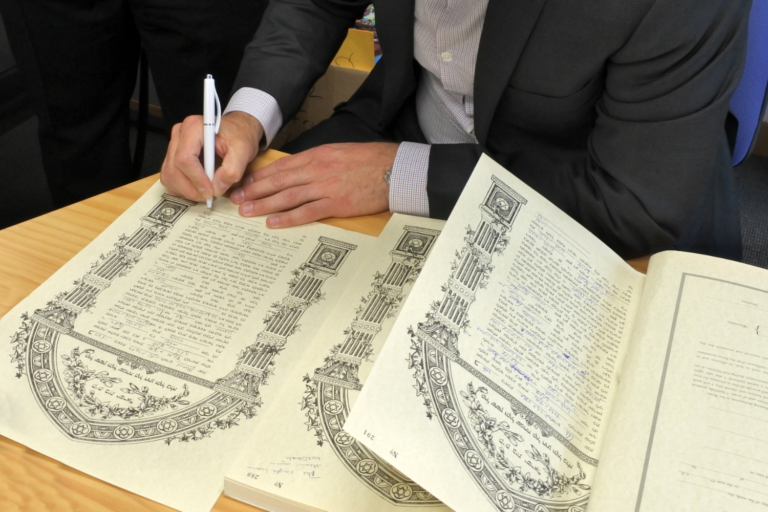
The signing of the ketubah is more than a simple legal document. It’s also an important symbolic document that outlines all the expectations and responsibilities of the bride and groom.
Ahead of the wedding, the couple meets with the rabbi to choose a ketubah that has a design and wording that suits them. This is partly because the ketubah is often framed and displayed after the wedding.
During the signing, the couple is joined by two witnesses, traditionally male and not related to the couple, who will also sign.
How do you book a Jewish wedding ceremony?
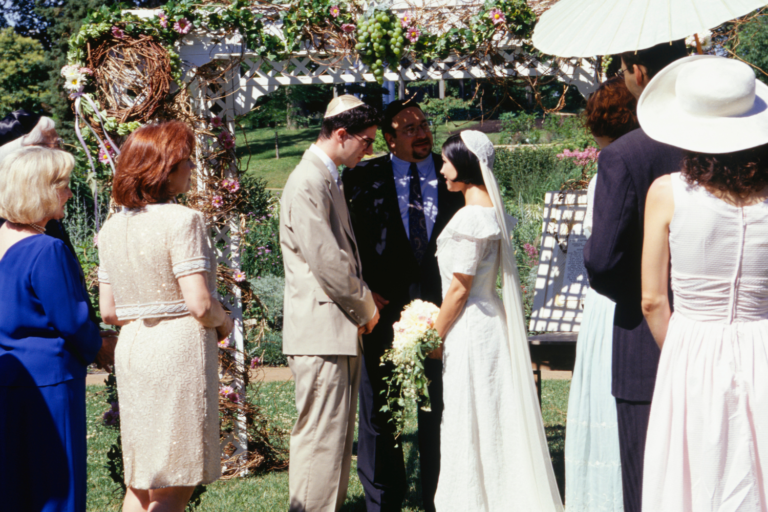
To book your Jewish wedding ceremony, visit your local synagogue and speak to your rabbi to discuss what you’d like from your upcoming wedding.
Who plans a Jewish wedding ceremony?

You can plan a Jewish wedding ceremony yourself with help from your rabbi. For the rest of your wedding day, you can plan this yourself or hire a wedding planner to help.
What comes after a Jewish wedding ceremony?
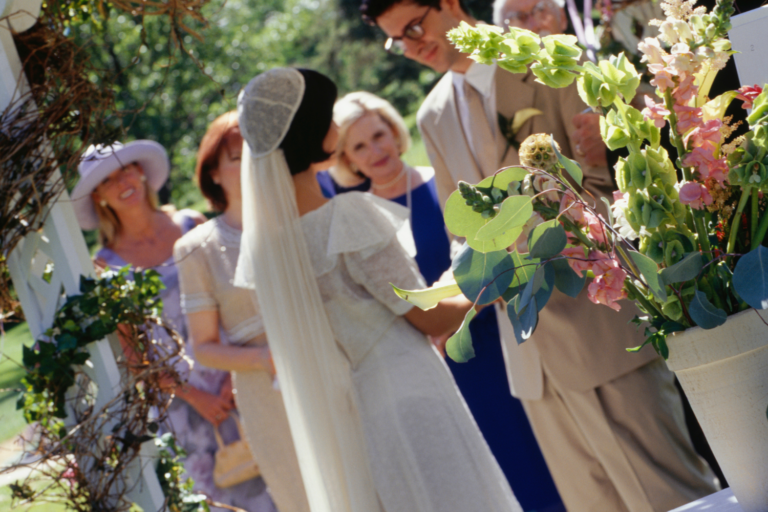
Traditionally, following a Jewish wedding ceremony, the bride and groom are taken to the yihud, which is a private room where they can spend a short period of time together. Many couples choose to eat their first meals as a married couple in the yihud. While inside, witnesses wait outside the door to make sure the couple isn’t disturbed.
Following the yihud, the couple rejoins their guests to take part in a feast, followed by celebrations, drinks and dancing.
Plan your wedding ceremony with Bridebook
Looking to plan your dream Jewish wedding ceremony? Sign up to Bridebook and access everything you need when planning your big day.
Browse other similar articles…
- The Ultimate Wedding Ceremony Guide
- The Ultimate Wedding Ceremony Order
- The Best Wedding Day Timeline
- How Long is a Wedding Ceremony?


